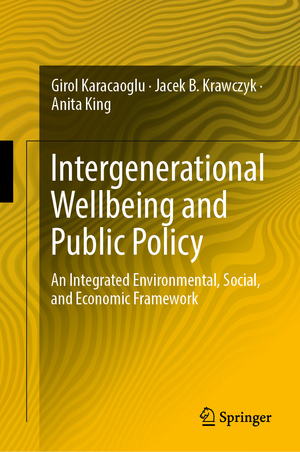Intergenerational Wellbeing and Public Policy: An Integrated Environmental, Social, and Economic Framework
Autor Girol Karacaoglu, Jacek B. Krawczyk, Anita Kingen Limba Engleză Hardback – 11 feb 2019
The book’s stylised model is constructed by weaving together threads from the wellbeing, human needs, complex systems, sustainable development, endogenous economic growth, directed technical change, and credit-based-money literatures. Throughout, the perspective is that of a policy adviser to a "wellbeing state", as distinct from a "welfare state". The key linkages or relationships in the model are supported by empirical evidence that draws on the wider literature in related fields.
Preț: 732.70 lei
Preț vechi: 893.54 lei
-18% Nou
Puncte Express: 1099
Preț estimativ în valută:
140.20€ • 146.10$ • 116.09£
140.20€ • 146.10$ • 116.09£
Carte disponibilă
Livrare economică 13-27 martie
Preluare comenzi: 021 569.72.76
Specificații
ISBN-13: 9789811361036
ISBN-10: 9811361037
Pagini: 246
Ilustrații: XXI, 247 p. 48 illus., 41 illus. in color.
Dimensiuni: 155 x 235 x 21 mm
Greutate: 0.59 kg
Ediția:1st ed. 2019
Editura: Springer Nature Singapore
Colecția Springer
Locul publicării:Singapore, Singapore
ISBN-10: 9811361037
Pagini: 246
Ilustrații: XXI, 247 p. 48 illus., 41 illus. in color.
Dimensiuni: 155 x 235 x 21 mm
Greutate: 0.59 kg
Ediția:1st ed. 2019
Editura: Springer Nature Singapore
Colecția Springer
Locul publicării:Singapore, Singapore
Cuprins
Chapter 1: Introduction and Overview.- Chapter 2: Stylised Model.- Chapter 3: Wellbeing-Enhancing Public Policy.- Chapter 4: Numerical Policy-Simulation Model.- Chapter 5: Wellbeing-Enhancing Public Policy - Extensions.- Chapter 6: Viability Theory for Policy Formulation.- Chapter 7: Themes.
Notă biografică
Girol Karacaoglu is Professor and Head of the School of Government at Victoria University of Wellington, New Zealand. His previous role was Chief Economist of the New Zealand Treasury. His current research interest is in public policy - an integrated approach to economic, environmental, and social policies towards improving intergenerational wellbeing.
Jacek B. Krawczyk is an adjunct academic at Flinders University, Adelaide, Australia, formerly with Victoria University of Wellington, New Zealand. His focus is on mathematical modelling of environmental processes, financial engineering, monetary policy, and optimisation of processes in each of these areas. His recent interest is in viability theory applications to economic dynamics.
Anita King is a Senior Analyst at The New Zealand Treasury, Wellington, New Zealand. With her PhD in physics, she is a specialist in developing and managing mathematical models that serve society, the environment,and the greater good.
Jacek B. Krawczyk is an adjunct academic at Flinders University, Adelaide, Australia, formerly with Victoria University of Wellington, New Zealand. His focus is on mathematical modelling of environmental processes, financial engineering, monetary policy, and optimisation of processes in each of these areas. His recent interest is in viability theory applications to economic dynamics.
Anita King is a Senior Analyst at The New Zealand Treasury, Wellington, New Zealand. With her PhD in physics, she is a specialist in developing and managing mathematical models that serve society, the environment,and the greater good.
Textul de pe ultima copertă
The distinctive contribution of this book is the formulation of an integrated social, environmental, and economic framework for public policy. This contribution is realised through investigations and conclusions in the following four domains: a formal stylised model that provides a platform for an integrated approach to public policy; a policy-informing simulation model that can be used to operationalise the public policy insights proposed in the stylised model; the implications of introducing fundamental (or radical) uncertainty and complexity into the policy framework; and the use of viability theory to demonstrate how one can think of and implement public policy in an uncertain and complex world, when the focus of policy needs to shift to building resilience to systemic risks.
The book’s stylised model is constructed by weaving together threads from the wellbeing, human needs, complex systems, sustainable development, endogenous economic growth, directed technical change, and credit-based-money literatures. Throughout, the perspective is that of a policy adviser to a "wellbeing state", as distinct from a "welfare state". The key linkages or relationships in the model are supported by empirical evidence that draws on the wider literature in related fields.
The book’s stylised model is constructed by weaving together threads from the wellbeing, human needs, complex systems, sustainable development, endogenous economic growth, directed technical change, and credit-based-money literatures. Throughout, the perspective is that of a policy adviser to a "wellbeing state", as distinct from a "welfare state". The key linkages or relationships in the model are supported by empirical evidence that draws on the wider literature in related fields.
Caracteristici
Provides a formal stylised model that can be used for public policy advice, based on an integrated environmental, social, and economic framework Allows for policy simulations by providing a numerical policy-simulation model Introduces viability theory as a tool for policy analysis and simulations
